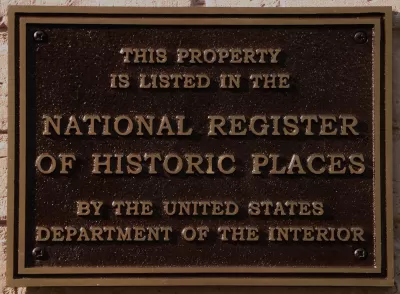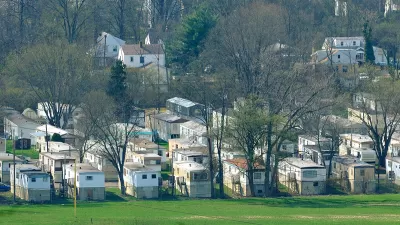The network of historic sites honors important events in the nation's history but overlooks places related to women and minorities.

The National Register of Historic Places recognizes buildings and locations across the United States that are "worthy of preservation," yet, in a country built on successive waves of immigration, the Register overwhelmingly acknowledges white history. With less than 8% of sites dedicated to people or events associated with women, African Americans, or other minorities, it's time to reevaluate the criteria for listings and use this resource to shine a light on all aspects of American history, according to a recent opinion piece by Sara Bronin.
Historic sites are designated based on significance and integrity—both highly subjective criteria that have favored events related to prominent white Americans. Integrity, in particular, can set an excessively high bar for places that haven't enjoyed institutional protection, writes Bronin. Sites significant to minorities have often been intentionally destroyed, displaced, or altered, thus making them ineligible for recognition in the National Register.
This year, the Register finally recognized a series of sites related to the Chicano Moratorium marches that galvanized the Chicano movement in Los Angeles in the early 1970s. Designation doesn't just confer a title. Sites entered into the National Register become eligible for tax credits, legal protection, and other tangible benefits that can protect a site from future development. Loosening requirements for architectural integrity and streamlining the application can lower the barrier to entry for overlooked sites and let more communities take part in the process, according to Bronin.
FULL STORY: Op-Ed: How to fix a National Register of Historic Places that reflects mostly white history

Planetizen Federal Action Tracker
A weekly monitor of how Trump’s orders and actions are impacting planners and planning in America.

Maui's Vacation Rental Debate Turns Ugly
Verbal attacks, misinformation campaigns and fistfights plague a high-stakes debate to convert thousands of vacation rentals into long-term housing.

San Francisco Suspends Traffic Calming Amidst Record Deaths
Citing “a challenging fiscal landscape,” the city will cease the program on the heels of 42 traffic deaths, including 24 pedestrians.

Amtrak Rolls Out New Orleans to Alabama “Mardi Gras” Train
The new service will operate morning and evening departures between Mobile and New Orleans.

The Subversive Car-Free Guide to Trump's Great American Road Trip
Car-free ways to access Chicagoland’s best tourist attractions.

San Antonio and Austin are Fusing Into one Massive Megaregion
The region spanning the two central Texas cities is growing fast, posing challenges for local infrastructure and water supplies.
Urban Design for Planners 1: Software Tools
This six-course series explores essential urban design concepts using open source software and equips planners with the tools they need to participate fully in the urban design process.
Planning for Universal Design
Learn the tools for implementing Universal Design in planning regulations.
Heyer Gruel & Associates PA
JM Goldson LLC
Custer County Colorado
City of Camden Redevelopment Agency
City of Astoria
Transportation Research & Education Center (TREC) at Portland State University
Jefferson Parish Government
Camden Redevelopment Agency
City of Claremont





























